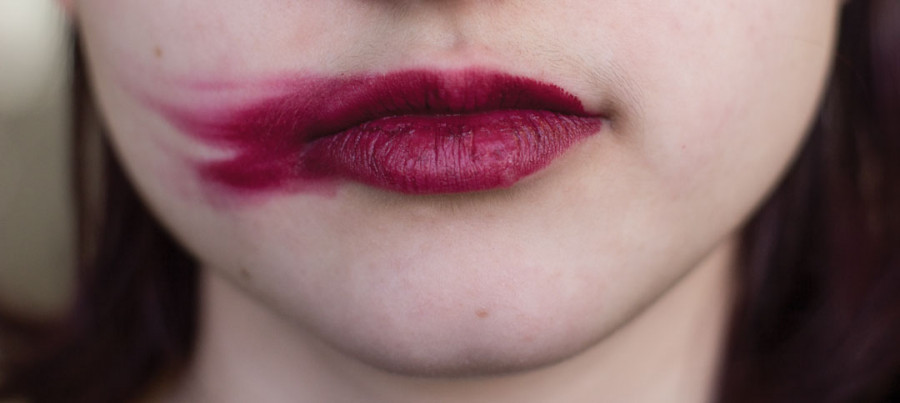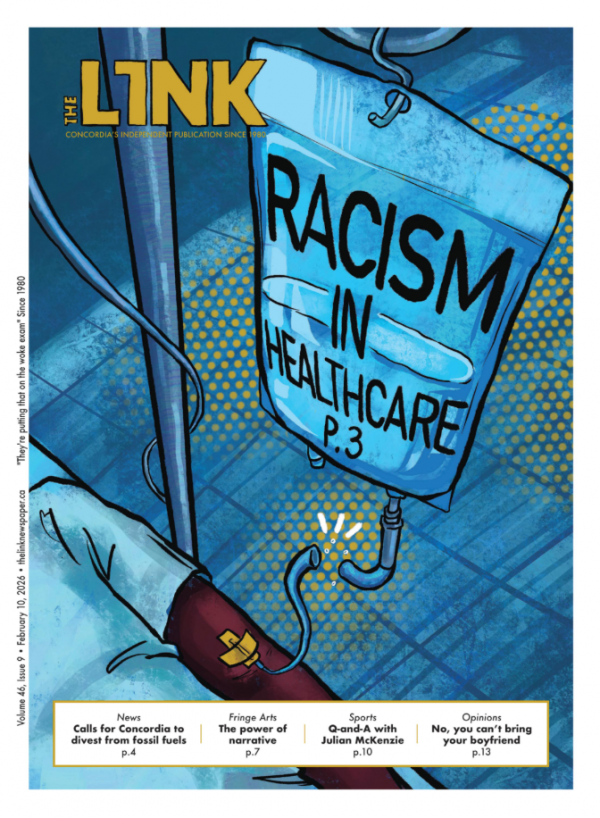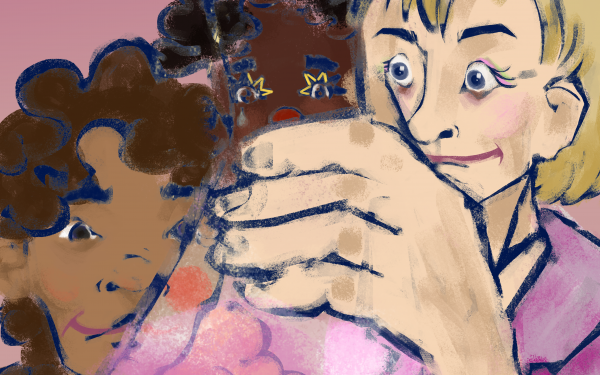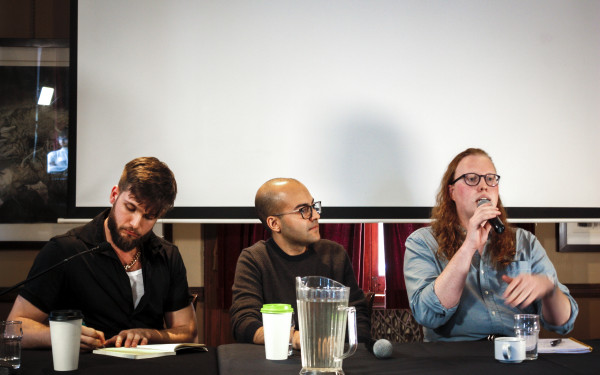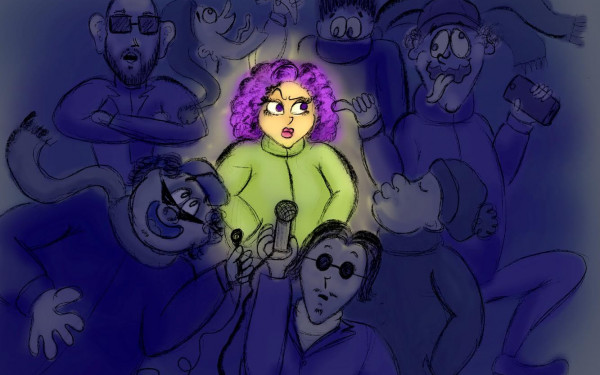Get Your Internalized Misogyny Away From My Dildo Collection
A Lipstick Lesbian Takes Off the Makeup
It’s 5:44 p.m. My phone screen lights up and blares a familiar ding—it’s a Tinder notification.
My heart doesn’t quite skip a beat with anticipation of this new match. Rather, I abruptly spring up, like bread just popped out of my dumpster-dived toaster.
This instills some anxiety in me. I wonder how the interaction will play out. Sometimes I’m pleasantly surprised to find that my bread is perfectly crisp, but other times it’s flat-out burnt, even if I set the dial precisely between two and three.
It’s always a gamble with these kinds of things. I emotionally brace myself before clicking on the notification, and after 15 minutes of light-hearted exchanges, it begins to feel like five minutes in the toaster isn’t so risky.
That is, until it happens again. It jumps out from around the corner, catching me off-guard.
“My boyfriend said it’s fine for me to be with other girls,” her message reads; a burn as charred as the heart of ingrained misogyny.
Internalized misogyny doesn’t only refer to the outright belief that women are inferior, but often to the byproducts of societal views causing women to doubt, shame, and undervalue themselves and each other. It’s insidious, and can be present even in the most socially conscious feminist thought.
Let me level with you here. As a lipstick lesbian, meaning a lesbian who appears to be more outwardly “feminine” than the stereotype, I am often treated like a sex toy to be used and then discarded once I’m no longer useful. Because of the way I present myself, it’s common for people to assume that I am a) promiscuous, b) confused, and c) willing to live up to both of those assumptions.
Don’t get me wrong—straight femme women face this same stigma. For lesbians, however, there is an extra layer that entices men in particular to challenge our identity. Lesbians who portray a more outwardly “masculine” appearance aren’t typically as fetishized or questioned as much. They may be perceived as more secure in their identity and are taken more seriously as a result, simply because they take on “masculine attitudes,” and that’s proof enough of their attraction to women.
If I had a dollar for every woman that asks me to have a threesome with her and her boyfriend, or every dude that has asked me if I’m sure I just haven’t found “the right guy yet,” I would stop having to dumpster dive for home appliances.
When I meet a woman in a monogamous relationship with a guy, and who is encouraged to be romantically involved with other women—but not other men, of course—I begin to ask questions.
“Why is he uncomfortable with you seeing other guys?” I ask.
“It’s different with a man. It insinuates that I’m not fulfilled in my current relationship,” she replies.
If I had a dollar for every woman that asks me to have a threesome with her and her boyfriend, or every dude that has asked me if I’m sure I just haven’t found “the right guy yet,” I would stop having to dumpster dive for home appliances.
“So in other words, it could be threatening?”
“Yeah, I guess so,” she admits.
I am so sick of having this conversation. “Because getting romantically and sexually involved with a woman isn’t as serious as if it were with a man?”
Silence.
This particular brand of situation comes from the same sort of harmful mentality that fuels questions like, “Who’s the man in the relationship?”
To which my answer is, “Luckily, neither of us!” Relationships don’t inherently need masculinity to be satisfying, happy, healthy, and complete.
The most prominent images of lesbians in the media are hyper-sexualized and primarily through the male gaze. “Lesbian” suddenly means “erotic,” and my sexuality has become an object. The beauty of a love between two women, and what I do in bed, is subsequently dehumanized.
Lesbians aren’t a fantasy. We are more than sex, and our sex has nothing to do with men. The concept that others can use us to explore their own sexuality, to satisfy their partner’s chimera, or to have mindless fun while in a monogamous relationship with a man, perpetrates the notion that women are less valuable and are to be taken less seriously than men.
The chance of another woman and I developing real feelings for each other is just as likely as if she were to become seriously romantically involved with a man.
My sexuality isn’t to be taken as a challenge for a guy to “turn” me. I don’t care if your husband is Barack Obama and you, Michelle, are messaging me on Tinder. My sexuality is not fluid just because another woman is present, either.
The whole argument of, “Well, you use dildos, right? Wouldn’t you rather have the real thing?” is also completely ridiculous. If you’re a man that enjoys anal sex with women, does it mean that you’re going to enjoy it with another man? Probably not. It’s a matter of attraction, not of practicality.
At the centre of the issue is honesty. Being dishonest and insincere about your intentions to involve a lesbian in a monogamous heterosexual relationship with double standards in place is inherently misogynistic. This is why it’s so important to be real with yourself, your partner or partners, and whoever you’re about to embark on a new sexual journey with.
We need to recognize that these desires and limitations are intertwined with internalized misogyny. To infer that a relationship between two women, regardless of commitment levels, is less important than a relationship between a man and a woman, is dangerous.
It’s disheartening for me when someone tries to manipulate me to fulfill their own desires, especially in a manner that is so objectifying and dismissive of my sexual identity. These circumstances can create trust issues and encourage biphobia as a result, harming everybody on the spectrum. Remember that lesbians—lipstick or not—don’t exist for your pleasure, for your exploration, for your boyfriend, or for you.
So if you ever do find yourself asking a lesbian these touchy questions, it’s time to assess your own identity, intentions, and facilitate an open discussion with your partner or partners. Because at the end of the day, all we want is to have our favourite bread toasted just right.

